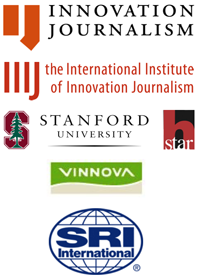 The other day I had breakfast with Apple CEO Steve Jobs.
The other day I had breakfast with Apple CEO Steve Jobs.And for the record; I was not alone, but sitting with hundreds of Eclipse software developers in the ball room at the Santa Clara Convention Centre.
We were listening to the Fake Steve Jobs, who is really Forbes magazine columnist Dan Lyons, author of the now legendary satirical blog that tries capture through fiction the real spirit of Apple's chief executive officer.
Lyons calls his blog "The Secret Diary of Steve Jobs," and, though a work of imagination, the diary has a strong following, especially among fervent Apple customers who both adore and are awed by the real Steve Jobs.
In an innovation economy, where overblown egos hype new products in search of a temporary advantage, and corporate spin is the weapon of choice, observers might think that exaggerated claims deserve to be ridiculed.
The Secret Diary first appeared on the computer screens in the summer of 2006. The writer was anonymous, and speculation over his or her identity began almost immediately. There was even some who believed Mr. Jobs himself penned the blog. Last year, The New York Times revealed Mr. Lyons as the author of the diary.
“I was covering things like IBM," he told his audience on Tuesday. "I was really bored; it was not a compelling job. I felt I could do it in my sleep."
He switched to blogging for Forbes, then -- inspired by the British magazine, Private Eye -- he decided to satirize Mr. Jobs, who after all is only the most fascinating -- and controversial -- personality in Silicon Valley.
“Why Steve Jobs? It’s obvious, I love Apple,” Mr. Lyons said. “But even if I do like their products I think the company is really strange. Their fans are really strange; they are like a cult that makes products."
In this diary, Jobs is presented as a narcissistic corporate titan with strange habits and a totally egocentric way of looking at what happens around him. The fake Steve Jobs, as presented by Mr. Lyons, is such a compelling character that some readers mistook the fake one for the real Jobs, asking for free products, coming up with ideas.
“The best part is that he doesn’t seem to realize that everyone around him hates him," he said. "Jobs is a notoriously bad manager.”
Writing the blog has also been an experience in how much a journalist can actually gain by getting into close contact with the readers, who came up with the name Fake Steve jobs.
“Right now a lot of the blog is actually driven by the audience and their comments," he said. "The audience interacting in real time is something new. It is very live, very dynamic. I get 25-50 emails a day, people doing movies and animation.”
Readers of Fake Steve Jobs already know all the ways he describes friends and foes. Microsoft is “The Borg” and Bill Gates the "Beastmaster". Jonathan Schwartz of Sun Microsystems was “the Pony tail”, until someone from the inside called and said that they call him “Pony boy”. Steve Ballmer is Uncle Fester and Apples own customers -- iTards.
Here are a few of his quips:
After visiting Macworld for the first time this year, he said, “Windows is like going to be normal again.”
On the plight of struggling Sun Microsystems, he said: “Every other week when Sun announces a new thing, it is always some line of bull.... I mean, how meaningless can you possible be?”
“I covered IBM for years," he observed, "and those were the worst in my life, is still having to go to a shrink to talk about it.”
And what would does the Fake Steve Jobs say about Nokia? "I heard about them but I don’t know what they do," he said. "I think they are some random company from Finland or stuff – or he gets it wrong or says they are from Sweden or something, he always gets countries wrong.”
What about Jim Cramer at Mad Money on CNBC – another media personality who has turned business journalism into entertainment?
“He is terrible," Mr. Lyons said. "I think you only have to look at him as entertainment and, he is an idiot, I can’t believe that he is on TV, I am appalled by it.”
Mr. Lyons' current favourite topic is the fetish over Apple's iPhone.
“I was appalled by the iPhone hysteria," he said. "A $600 phone, I thought it was stupid but also very scary, people waiting outside in the rain for five or six days.”
Fake Steve Jobs can be seen as innovation in journalism, but Mr. Lyons still has a day job to return to at Forbes.
Afterwards, when the roars of laughter from hundreds of nerds had gone by, we talked about the state of business journalism in the U.S. He thinks is too much CEO celebrity, too little serious journalism, except at Forbes, Business Week and Wall Street Journal. The Economist is his big favourite.
“I tried it a little bit in this column with the Forbes; to use a little bit of the humour and voice in what I do for Fake Steve in that forum, but no, I understand its different things, it’s a different mode writing that column.”



